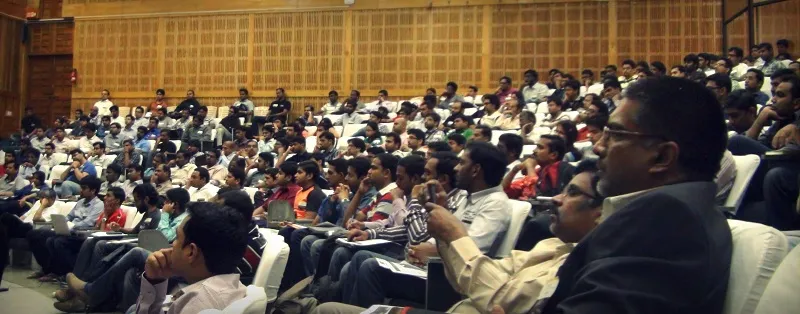Cloud is like a fertilizer that creates startups: learnings from AWS Cloud Kata, Bangalore
It is almost two years since Eric Ries said, “Cloud is like a fertilizer that creates startups.” Today, we can see many startups existing and thriving because of this fertilizer.
Amazon Web Services, the leading Cloud service provider, has constantly evolved to keep up with the need of startups and small businesses. Recently, AWS Cloud Kata 2014, India, concluded with the Bangalore event which saw some of the best testimonials and examples of leveraging Cloud for businesses. AWS Cloud Kata sessions are meant for growth stage startups or a tech geek looking to leverage Cloud to build and enhance a product or solution. It is the best place to discover pro tips that will help your startups to go from an idea to a minimum viable product (MVP), scale and profitability. Over 300 entrepreneurs and business professionals attended the sessions.

Santanu Dutt, Solutions Architect at Amazon Seller Services, started with the introduction of AWS and spoke about the features, benefits and technological aspects of AWS. You can read more about it here.
Leveraging AWS
There were multiple testimonials shared in the sessions where entrepreneurs who have successfully scaled up were vocal about how they leveraged Cloud to optimize their resource consumptions, scale up rapidly and achieve profitability. Veer Bahadur, VP – Engineering, Sportkeeda said,
“We shifted to AWS in April 2011 when our visits were 11,0000/month with 200 writers. In the last three years we have grown manifolds with over a million visits and the experience remains glitch-free. With AWS, one can focus on building apps without being concerned about infrastructure. It is good in case you’re looking for scaling up, better services and saving time.”
Similar thoughts were echoed by Harishankaran K, Co-founder and CTO, Interviewstreet; Yaser Hameed, C0-founder, Dexetra and Vijay Rayapati, CEO, Minjar.
Power-packed VC panel
The VC panel consisted of Anand Daniel (Accel Partners), Gautam Mago (Sequoia Capital), Parag Dhol (Inventus), Sudhir Sethi (IDG Ventures) and moderated by Gaurav Arora (ASSPL). The panel discussed some key trends, challenges and their interests:

- Moving out of India: At this point of time, Cloud and enterprise companies have to go for global market and not restrict themselves to India. Another important factor while considering moving outside is unit economics which is unfortunately not good in India. This impacts the rapid scaling up of a venture. One should deploy capital into those markets first where unit economics is much higher.
- Trends: Mobility, big data and hardware are the sectors to watch out for in the near future. There is an upcoming trend of patents (IP) in defense and telecom sector too. Machine to machine communication is a hard business to build but if it combines with mobile, it will be an interesting thing.
- Preferring companies from accelerators for investing: Not just accelerators but any institution which brings maturity to a company and raise it up to a level that a VC can look into it is valuable. Accelerators are definitely building up a head of steam and doing a great job by supplying good number and quality of startups.
- Most common mistakes of first time entrepreneur: Lack of focus i.e. doing too many things, is the most common mistake which first time entrepreneurs make. A company should be technology outward and market inwards. Entrepreneurs starting up for the first time lack in the latter because of which the products are not consumed in the market. They tend to hire wrong which plays a vital role in the growth of a company because you’re as good as your team. They should quicken the firing process as well.
Do read the learnings from Delhi & Mumbai sessions.
Do share your thoughts on the upcoming trends in the Indian startup ecosystem in the comments below.
Related posts:
- 5 Techniques to get more from your AWS Deployments
- Takeaways from the AWS Cloud Kata session in Delhi
- Takeaways from the AWS Cloud Kata session in Mumbai
- Common Mistakes Entrepreneurs Make and How to Avoid Them







